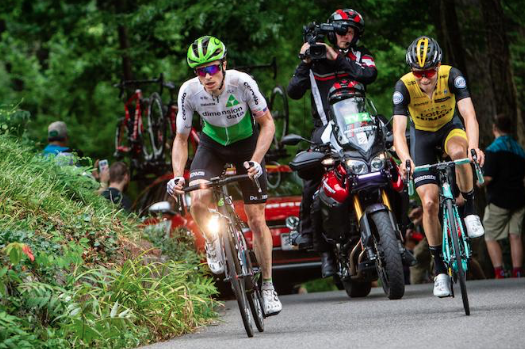Ben King is a professional cyclist riding for Team Dimension Data for Qhubeka from Charlottesville, Virginia. His family name is well-known here in Richmond and across Virginia as synonymous with excellence in cycling. When he’s not biking, he enjoys playing guitar, fishing, and archery. His favorite Bible verse is:
More than that, we rejoice in our sufferings, knowing that suffering produces endurance, and endurance produces character, and character produces hope, and hope does not put us to shame, because God’s love has been poured into our hearts through the Holy Spirit who has been given to us. Romans 5:3-5
I got in touch with Ben King to interview him and I asked him this question:
There is really only one question I’ve always wanted to ask a professional cyclist and that is how do you know the difference between using your body to it’s fullest extent and abusing it? Like how do you know you have giving it everything you have without overdoing it?
Well that’s two questions. I ask because I think to myself often that if I had the time to train full-time, I would want to use every minute of the day to be the best I could be but I know that’s an easy way to burn out. But if I didn’t over-train myself I would constantly be worried that my opponents trained one minute longer than I did or did some small thing I didn’t to get an edge. You know what I mean?
Here is his response:
Hi Christian,
There are a lot of different ways to answer that question. The only way to know for sure is to constantly measure everything from blood values, sleep patterns, TSS, CTL, metabolic factors, and heart rate variability to perceived effort and external life stress. To over simplify it, I will say two things. First, it’s better to be 10% undertrained than 2% overtrained. Second, it’s very hard to overtrain. Overreaching in certain periods is important and will decrease performance in the short term, but overcompensation in the recovery process is what leads to increased fitness. But, overtraining syndrome by definition can require months to recover from. Also, if you’re doing so much quantity that it affects the quality of your work, then the training becomes counterproductive.
[bctt tweet=”It’s better to be 10% undertrained than 2% overtrained –Ben King” username=””]
When it comes to the quality, it’s easy to know when you’ve given it everything in a shorter effort or time trial. But how much quality to include is trickier and requires careful planning and periodisation. The goal of training is to get stronger and race better. I’ve seen plenty of guys show up and “win” training camps but be useless in races. Out training the competition means working harder AND smarter.
Whether the competition does an extra minute cruising home, makes no difference. If they’re doing a few more hours per week might not even matter. You have to train for the races you do. Most of my races aren’t longer than 6 hours so it does me no good to ride slower for 8 hours. In fact, I rarely train more than 5 hours, and when I’m getting high volume in races, I rarely do more than 3 hours rides between them, but I pack quality into that time to keep sharp.
[bctt tweet=”Whether the competition does an extra minute cruising home, makes no difference. If they’re doing a few more hours per week might not even matter. You have to train for the races you do. –Ben King” via=”no”]
If you’re racing a criterium with a one minute climb in it, then you’ll need a high one minute power. So, you do a one minute test. Then you do intervals at 80-90% of that power (or distance you can make it up a climb in one minute if you don’t have a power meter). On your hardest days, you can go to failure. But failure doesn’t mean you can’t pedal your bike, it just means you can’t maintain 80% of your max. Then as your fitness increases you can play around with things like decreasing recovery time between efforts, etc. And then you need to rest because if you were to do that every day, you might build endurance and fatigue resistance but not improve your one minute power.
So training has to be focused. Working with a coach can take the guess work out of it and frees your mind. It gives you something to trust in so you’re not second guessing every work out, especially when you’re tired and things aren’t going well. A good coach will sometimes have a better idea than you when you should push through fatigue and when it’s ok to take a day off. Even a parent or very close friend can look in your eyes and know when it’s time to take a day off. It’s important to have those people in your life.
About the Velodrome, wow! That would be incredible, and I totally agree there’s a place for it.
Take care,
BK

